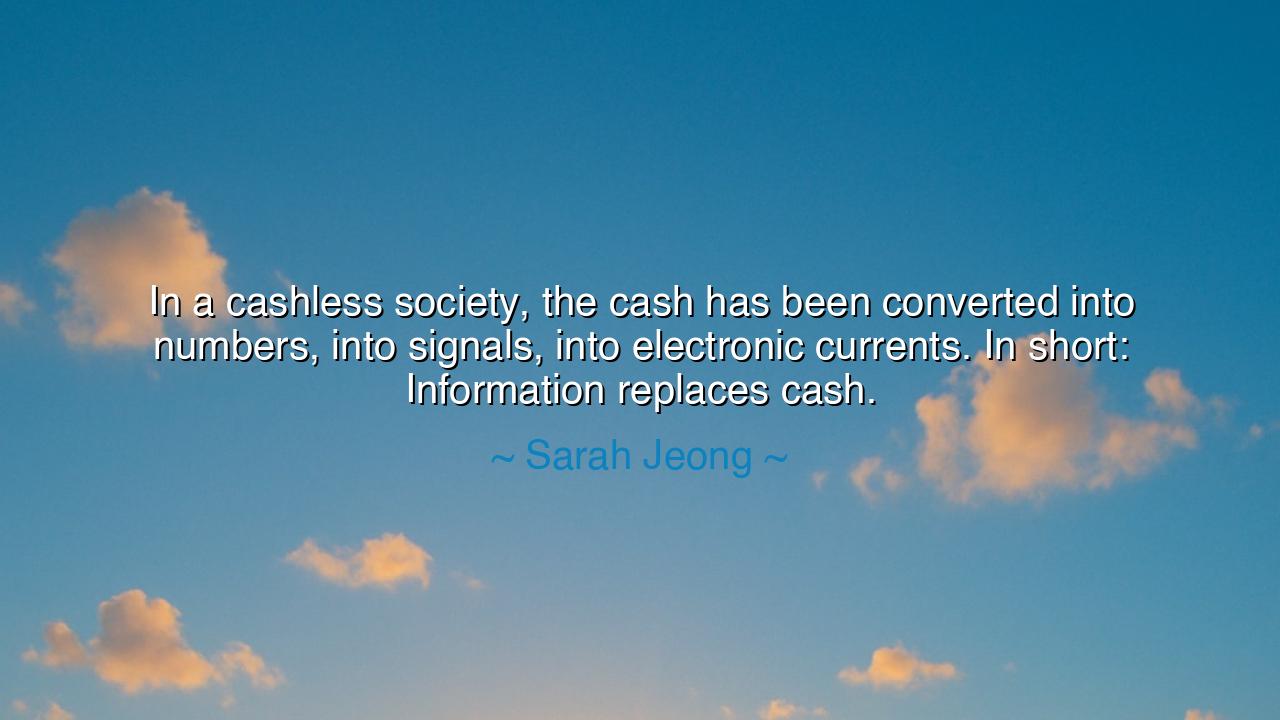
In a cashless society, the cash has been converted into numbers
In a cashless society, the cash has been converted into numbers, into signals, into electronic currents. In short: Information replaces cash.






"In a cashless society, the cash has been converted into numbers, into signals, into electronic currents. In short: Information replaces cash." These words, spoken by Sarah Jeong, reveal a profound truth about the changing nature of money and society. In an age when coins and paper bills once held tangible weight, there is now a quiet transformation at work. The physical representation of wealth has been erased, replaced by numbers, by signals, by the invisible currents of the digital world. No longer does the coin hold its weight in gold, no longer does the dollar bill carry the promise of something concrete. Instead, our value is now translated into a series of ones and zeros, floating in the vast sea of information. What we once held in our hands, we now carry in our minds, as numbers and data take the place of cash, of physical wealth.
In the ancient world, money was a symbol of both prosperity and power. The Romans used their coinage not just as a means of trade but as a statement of imperial dominance. The gold denarius was more than just currency—it was a symbol of the empire, a physical token that represented the wealth, the authority, and the far-reaching power of Rome. To hold a coin was to hold a piece of the empire itself. It was tangible, real, and imbued with meaning. In the same way, the Greek drachma, or the Egyptian pound, was more than just a means of exchange—it was the manifestation of the society’s values, its goals, and its aspirations.
But now, as Jeong so aptly points out, information has come to replace cash. The physical currency we once knew has been dissolved into the digital realm. What was once a piece of gold, a tangible object that we could hold in our hands, is now simply a digital signal, transmitted through electronic currents, carried in numbers that flow unseen through the veins of our society. Today, when we make a purchase, when we earn our living, we rarely touch anything of substance. Instead, we see numbers change on a screen, and that change represents our wealth, our value, our power in the world. The money we once knew is no longer a physical reality—it has become a concept, an abstraction, a shifting current of information.
This transformation is not merely a technological shift; it is a philosophical one. The very idea of wealth is no longer rooted in the physical world of material objects. No longer is money something we can touch, something we can feel. It has become a representation of information, of data, of the networks that weave through every part of our lives. To understand this change, let us look at the story of the first digital currencies—the birth of Bitcoin and its blockchain. When Bitcoin first emerged, it was a radical new way of thinking about currency. It was decoupled from the tangible assets that once backed our wealth, and instead, it relied on mathematics and digital verification. This was a bold new world in which value was not grounded in gold or land but in the information that moved through computer systems. Here, data and algorithms became the new currency, and information the new wealth.
This shift, however, is not without its consequences. In the ancient world, money could be hoarded, it could be physically protected, and it could be used to assert control over a person or a place. Wealth was tied to physical resources, to the land you owned, the goods you possessed. But now, in a cashless society, wealth is no longer something that can be guarded or touched. It exists in the clouds, in databases, in the electronic ether. The power once held in the hands of those who controlled material wealth now resides with those who control information. The banks, the governments, and the corporations that control our data, our personal information, and our financial transactions hold the keys to a new kind of power. This is not a power rooted in tangible things, but in the unseen flows of information that dictate so much of our lives.
Yet, Jeong’s insight challenges us to think about the larger implications of this transformation. What happens when information becomes the currency of our world? When data becomes more valuable than the gold of ancient kings? We must ask ourselves: Who controls the information? Who holds the keys to the systems that govern our wealth? In this world, the individual can no longer hold onto tangible resources in the same way. We are increasingly dependent on the systems that track our every transaction, our every movement, our every click and purchase. The lines between wealth and control become blurred, and with this blurring comes the loss of freedom—a freedom that was once tied to the physical world but is now increasingly dominated by the invisible forces of data.
The lesson, then, is this: As we move further into the digital age, we must be conscious of the power that information holds in our lives. We must ask ourselves, as societies, how we wish to balance the freedom of the individual with the control of the powerful entities that now hold dominion over our data. In the ancient world, power was found in the ownership of resources. Today, it is found in the ownership of information. Let us ensure that as we evolve, we do not lose our agency, our voice, our ability to shape our own future in this new world of data. For in the age of information, the most valuable currency we hold is not just what we own, but what we know—and how we use that knowledge.






AAdministratorAdministrator
Welcome, honored guests. Please leave a comment, we will respond soon